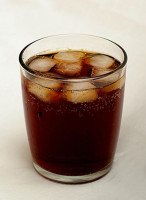26 Feb Young Adults, Southeners, Drink Most Sugar-Sweetened Beverages
MedicalResearch.com Interview with:
Sohyun Park, PhD
Epidemiologist
Epidemiology and Surveillance Team
Obesity Prevention and Control Branch
Division of Nutrition, Physical Activity, and Obesity
National Center for Chronic Disease Prevention and Health Promotion
Centers for Disease Control and Prevention
Atlanta, Georgia
Medical Research: What is the background for this study? What are the main findings?
Dr. Park: The 2013 BRFSS provides the most recent state data for this behavior using a short screener which showed that about 1 in 3 adults consumed sugar-sweetened beverages (SSBs) at least once per day, and SSB intake differed by state and by certain subgroups.
The main findings of the study showed the following among the 23 states and DC surveyed the prevalence of adults who consumed sugar-sweetened beverages at least once daily was:
- Aged 18-24 years (43.3%)
- Men (34.1%)
- Non-Hispanic Blacks (39.9%)
- Unemployed (34.4%)
- Had less than a high school education (42.4%)
- Adult sugar-sweetened beverages intake was highest in Mississippi (47.5%), followed by Louisiana (45.5%) and West Virginia (45.2%).
- The prevalence of sugar-sweetened beverages intake one or more times per day among younger adults (18–24 years) was 2.3 times the prevalence among the older adults (aged 55 years and older)—43.3% versus 19.1%, respectively.
Medical Research: What should clinicians and patients take away from your report?
Dr. Park: There is no nutritional benefit in sugary drinks. Sugar-sweetened beverages are major sources of added sugars and calories in U.S. diets, and daily SSB intake has been associated with adverse health consequences such as obesity, Type 2 diabetes, and cardiovascular disease. Clinicians can screen and counsel patients on reducing SSB intake, inform patients about the health effects of frequent SSB intake, and encourage their patients to choose healthier beverages as often as possible. Patients should know that reducing sugar-sweetened beverages consumption as part of a healthy lifestyle might help with weight management and lower the risk for chronic disease. People who want to reduce their daily added sugar intake can replace sugar-sweetened beverages with healthier beverages, such as plain water, water with fruit or unsweetened coffee or tea.
Medical Research: What recommendations do you have for future research as a result of this study?
Dr. Park: Future research could monitor trends in sugar-sweetened beverages intake by states and communities, examine potential reasons for these geographical differences in SSB intake, explore motivating factors for reducing SSB intake, and assess components of effective education initiatives on knowledge around added sugars.
Medical Research: Is there anything else you would like to add?
Dr. Park: Because of the potential adverse health outcomes associated with sugar-sweetened beverages intake, including obesity, type 2 diabetes, and cardiovascular disease, public health practitioners should continue efforts aimed at decreasing SSB intake among demographic groups with the highest reported consumption.
Citation:
Prevalence of Sugar-Sweetened Beverage Intake Among Adults — 23 States and the District of Columbia, 2013
MMWR Weekly / February 26, 2016 / 65(7);169–174
Sohyun Park, PhD1; Fang Xu, PhD2; Machell Town, PhD2; Heidi M. Blanck, PhD
[wysija_form id=”5″]
Sohyun Park, PhD (2016). Young Adults, Southeners, Drink Most Sugar-Sweetened Beverages
American Heart Association Comment on Sugary Drink Consumption Report from CDC
– Nancy Brown, CEO of the American Heart Association:
“The evidence is clear that too much sugar contributes to heart disease and death, yet a new CDC report shows one in three Americans are still drinking sugary drinks at alarming rates. Many beverages that have been promoted as healthy are, in fact, loaded with too much sugar. Sweet tea, fruit drinks, sports drinks as well as regular sodas often contain more sugar than we recommend in one day for the average adult, yet they are consumed by children and adults alike on top of other sugary foods. In order to turn the tide on heart disease and diabetes, the American Heart Association advocates for sweeping changes to shift the culture towards heart-healthy living.”
Last Updated on February 26, 2016 by Marie Benz MD FAAD


